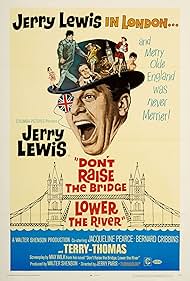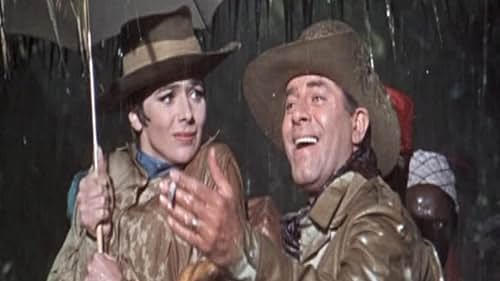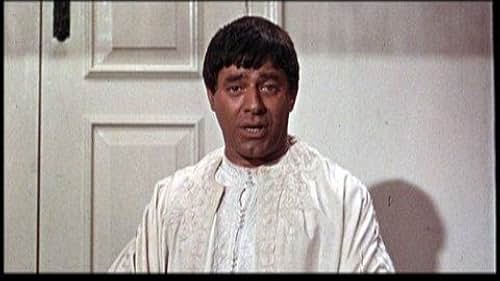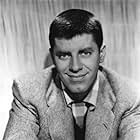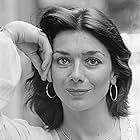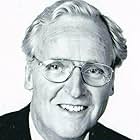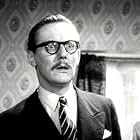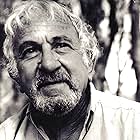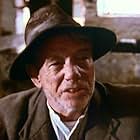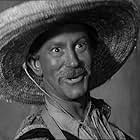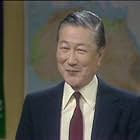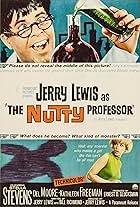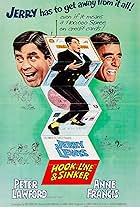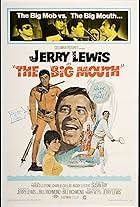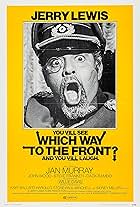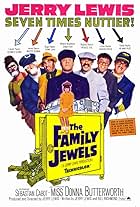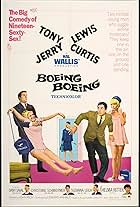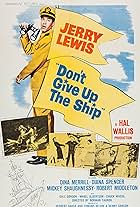An American plans to bilk the British out of some considerable money with the help of an English con artist.An American plans to bilk the British out of some considerable money with the help of an English con artist.An American plans to bilk the British out of some considerable money with the help of an English con artist.
Robert Lee
- Bruce
- (as Robbie Lee)
Storyline
Did you know
- TriviaIn an interview on Australia's Studio 10, Patricia Routledge called working with Jerry Lewis a nightmare. She did not find him funny and reflected on her scene with him. Stating that despite director Jerry Paris being satisfied with their two takes, Lewis insisted on doing additional takes. A total of 14 takes were completed before Lewis was satisfied.
- GoofsIn the opening scene, George Lester is walking east across Piccadilly Circus. The next two shots show him walking east toward Piccadilly Circus - first in front of the Royal Academy of Art, then on the opposite side of the street passing Simpson's department store.
- Quotes
Dr. Pinto: [examining Homer's teeth] If you like, I could close that gap you've got there.
H. William Homer: You close my gap, I'll open yours.
- ConnectionsReferenced in Mystery Science Theater 3000: Godzilla vs. Megalon (1991)
- SoundtracksDon't Raise the Bridge, Lower the River
Music by David Whitaker
Lyrics by Hal Shaper
Sung by Danny Street
Featured review
I'm well known--well, or at least I'd like to be well known--for arguing that it's a mistake to identify genres with emotional reactions in viewers. For example, I think it's wrong to conflate "horror" and "scary movie", where "scary" is intended to describe the emotional reaction the film is supposed to cause in the viewer. "Horror" instead should describe the content of the film and (maybe) the way that content is handled. Likewise with comedy, although the identification of modern comedies and laughter is probably the most difficult case to disentangle. (If we use the traditional sense of "comedy", the disentangling is much easier.)
I bring all of this up not to bore you, or even to flabbergast you with how pretentious, pompous, or pseudo-intellectual I sound (or whatever other epithet you'd like to apply). I bring it up merely to say that the problems I had with Don't Raise the Bridge, Lower the River aren't solely based on it being a largely unfunny comedy--which it is. There are unfunny comedies that can be good films. Just like horror films need not be scary to be good, comedies need not be funny, or need not primarily aim for that. But Don't Raise the Bridge, Lower the River has a host of other problems that make it not succeed above a "D" level, or a 6.
It's difficult, at least this far removed in time, to say what exactly director Jerry Paris was shooting for here. The film is about George Lester (Jerry Lewis). The beginning has a quickly progressing sequence where we see George go from being a kid to meeting his wife and already having problems with her as he takes her on extreme business trips (often in hostile environments) across the globe. This all happens in maybe four or five minutes. The common theme throughout these all-too-quick scenes, and the gist of the film, is that George is a cross between a misguided dreamer/entrepreneur and a con-man/shyster.
Unfortunately, this opening sequence was maybe the best thing about Don't Raise the Bridge, Lower the River. There was a good story in following George as he grew up, met his wife and went on crazy business trips. Much of the opening is funny. This material should have been stretched into feature length.
But instead, Paris and writer Max Wilk, adapting his own novel for the screenplay, give us a very convoluted story set while George and his wife, Pamela (Jacqueline Pearce), are getting divorced. The film ends up being about a confused scheme to bilk some oil sheiks out of £50,000 and at the same time, get George's wife back into his arms. The premise isn't bad, but the script and the direction are a mess.
It doesn't help that Paris seems like he tried to reel Lewis in a bit--or maybe Lewis was trying to appear relatively more serious and sophisticated. Whatever the cause, the result is that Lewis is a bit boring and uncharismatic, and when he tries to do more manic comic bits, they tend to fall flat. Constructing the plot so that Lewis is stuck at home, mostly not interacting with others, wasn't a great idea either. It's like a literal representation of "phoning in" a performance. At the same time, it's clear that Paris was often going for a "madcap comedy", but he achieves neither a convincing "madcap" feeling nor many laughs.
Pearce's performance is decent, but she seems to be in the wrong film. Her tone doesn't match anyone else's. There are also two very good supporting actors, Terry-Thomas, as fellow shyster H. William Homer, and Patricia Routledge, as Lucille Beatty. Both do the best job they can given the script and direction problems, but neither quite manage to take off--either they just can't muster the momentum to take over as they need to, or they weren't allowed to.
It's not that the film is a complete disaster. There are occasional sections that work, such as the beginning, mentioned above. There are also occasional sections that are funny, such as the idea of turning the house into a restaurant/disco, and the scenes featuring Fed Davies (Bernard Cribbins) in his second job (although the fact that he had two jobs wasn't explained very well). More often, there are scenes that might make you smile. But overall, the film is quite a trainwreck, because of the bad story/script and direction, despite the fact that the ending is satisfying, and the actors keep doing their best to surmount the difficulties.
Also on the positive side, the cinematography is crisp ad colorful if not particularly innovative, and the sets/locations are occasionally attractive. But this is not nearly enough to recommend the film.
I don't think I've seen any of Paris' other films yet, although I've seen a lot of his television work, which was often quite funny--he's directed episodes of "The Dick Van Dyke Show" (1961), "Mary Tyler Moore" (1970), and "The Odd Couple" (1970), for instance--all excellent shows. Maybe his talent was more suited for filling in 22 minutes of a comedy template than the more free-form structure of a feature film.
I bring all of this up not to bore you, or even to flabbergast you with how pretentious, pompous, or pseudo-intellectual I sound (or whatever other epithet you'd like to apply). I bring it up merely to say that the problems I had with Don't Raise the Bridge, Lower the River aren't solely based on it being a largely unfunny comedy--which it is. There are unfunny comedies that can be good films. Just like horror films need not be scary to be good, comedies need not be funny, or need not primarily aim for that. But Don't Raise the Bridge, Lower the River has a host of other problems that make it not succeed above a "D" level, or a 6.
It's difficult, at least this far removed in time, to say what exactly director Jerry Paris was shooting for here. The film is about George Lester (Jerry Lewis). The beginning has a quickly progressing sequence where we see George go from being a kid to meeting his wife and already having problems with her as he takes her on extreme business trips (often in hostile environments) across the globe. This all happens in maybe four or five minutes. The common theme throughout these all-too-quick scenes, and the gist of the film, is that George is a cross between a misguided dreamer/entrepreneur and a con-man/shyster.
Unfortunately, this opening sequence was maybe the best thing about Don't Raise the Bridge, Lower the River. There was a good story in following George as he grew up, met his wife and went on crazy business trips. Much of the opening is funny. This material should have been stretched into feature length.
But instead, Paris and writer Max Wilk, adapting his own novel for the screenplay, give us a very convoluted story set while George and his wife, Pamela (Jacqueline Pearce), are getting divorced. The film ends up being about a confused scheme to bilk some oil sheiks out of £50,000 and at the same time, get George's wife back into his arms. The premise isn't bad, but the script and the direction are a mess.
It doesn't help that Paris seems like he tried to reel Lewis in a bit--or maybe Lewis was trying to appear relatively more serious and sophisticated. Whatever the cause, the result is that Lewis is a bit boring and uncharismatic, and when he tries to do more manic comic bits, they tend to fall flat. Constructing the plot so that Lewis is stuck at home, mostly not interacting with others, wasn't a great idea either. It's like a literal representation of "phoning in" a performance. At the same time, it's clear that Paris was often going for a "madcap comedy", but he achieves neither a convincing "madcap" feeling nor many laughs.
Pearce's performance is decent, but she seems to be in the wrong film. Her tone doesn't match anyone else's. There are also two very good supporting actors, Terry-Thomas, as fellow shyster H. William Homer, and Patricia Routledge, as Lucille Beatty. Both do the best job they can given the script and direction problems, but neither quite manage to take off--either they just can't muster the momentum to take over as they need to, or they weren't allowed to.
It's not that the film is a complete disaster. There are occasional sections that work, such as the beginning, mentioned above. There are also occasional sections that are funny, such as the idea of turning the house into a restaurant/disco, and the scenes featuring Fed Davies (Bernard Cribbins) in his second job (although the fact that he had two jobs wasn't explained very well). More often, there are scenes that might make you smile. But overall, the film is quite a trainwreck, because of the bad story/script and direction, despite the fact that the ending is satisfying, and the actors keep doing their best to surmount the difficulties.
Also on the positive side, the cinematography is crisp ad colorful if not particularly innovative, and the sets/locations are occasionally attractive. But this is not nearly enough to recommend the film.
I don't think I've seen any of Paris' other films yet, although I've seen a lot of his television work, which was often quite funny--he's directed episodes of "The Dick Van Dyke Show" (1961), "Mary Tyler Moore" (1970), and "The Odd Couple" (1970), for instance--all excellent shows. Maybe his talent was more suited for filling in 22 minutes of a comedy template than the more free-form structure of a feature film.
- BrandtSponseller
- May 20, 2005
- Permalink
- How long is Don't Raise the Bridge, Lower the River?Powered by Alexa
Details
- Release date
- Country of origin
- Language
- Also known as
- Der Spinner
- Filming locations
- Piccadilly Circus, Piccadilly, London, England, UK(opening credits: George crosses)
- Production company
- See more company credits at IMDbPro
- Runtime1 hour 39 minutes
- Aspect ratio
- 1.85 : 1
Contribute to this page
Suggest an edit or add missing content

Top Gap
By what name was Don't Raise the Bridge, Lower the River (1968) officially released in Canada in English?
Answer